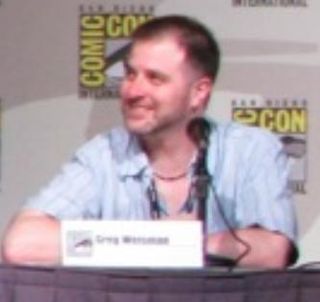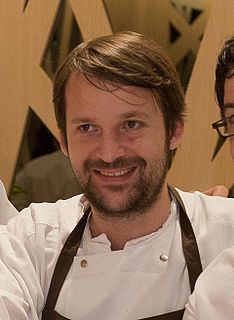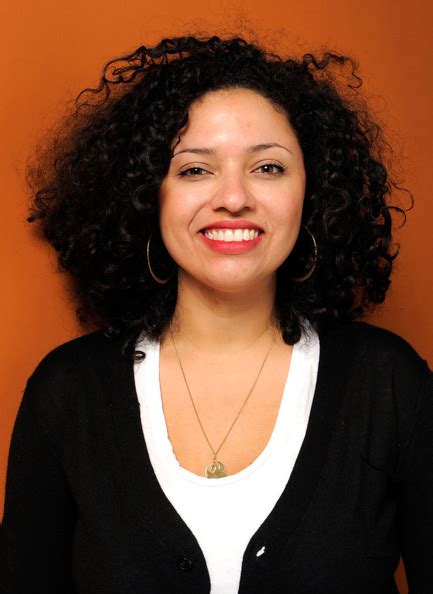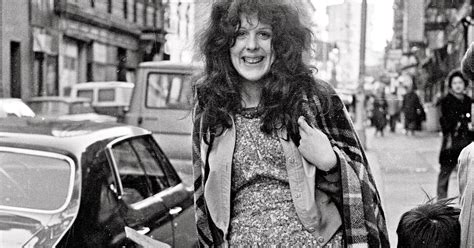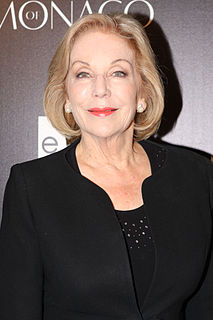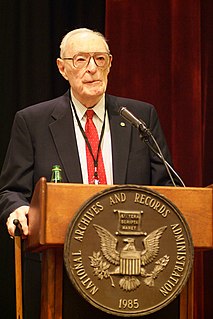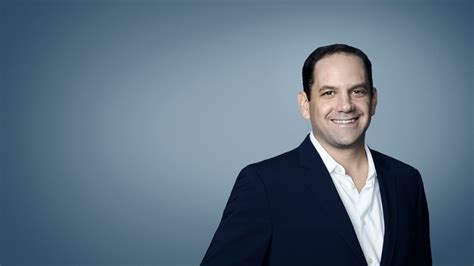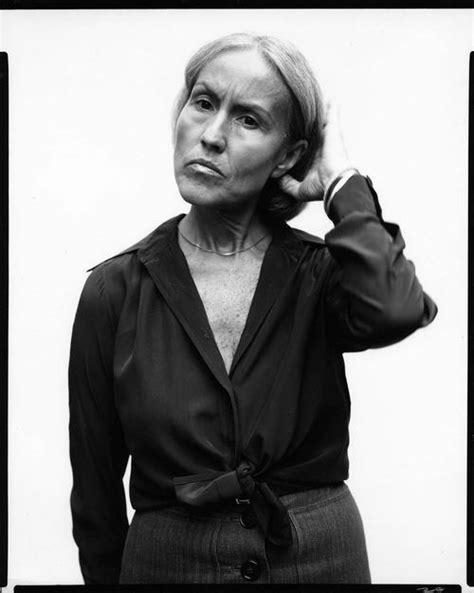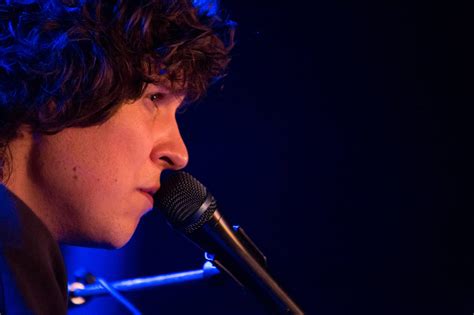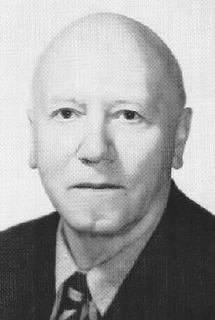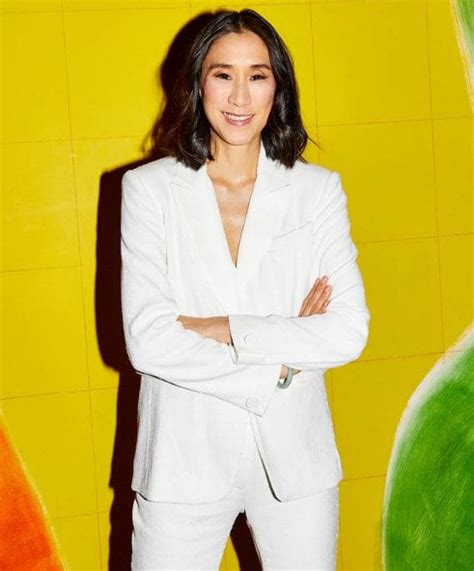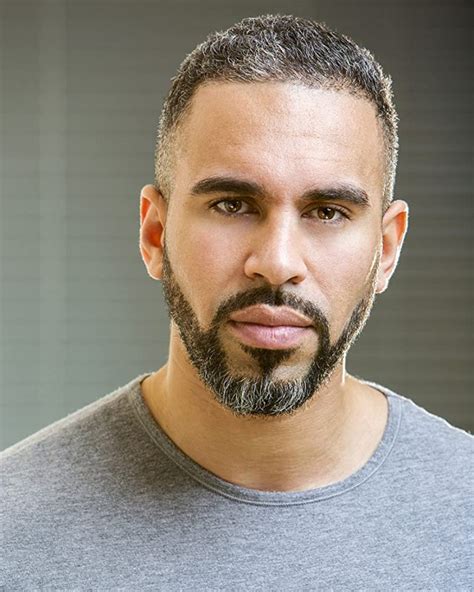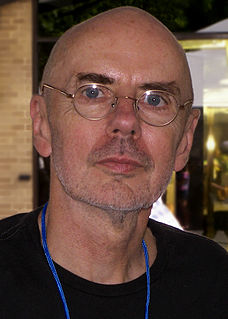Top 976 Editor Quotes & Sayings - Page 16
Explore popular Editor quotes.
Last updated on December 4, 2024.
About a year after (my stories began being published), magazine editor George Scithers, suggested to me that since I was so new at being published, I must be very close to what I had to learn to move from fooling around with writing to actually producing professional stories. There are a lot of aspiring writers out there who would like to know just that. Write that book.SFWW-I is that book. It's the book I was looking for when I first started writing fiction.
When I devoted myself to poetry - and poetry is a very serious medium - I don't think the people that knew me as an individual with that tongue-in-cheek kind of humor...well, it didn't always lend itself to my poetry. When you're writing poetry, it's like working with gold, you can't waste anything. You have to be very economical with each word you're going to select. But when you're writing fiction, you can just go on and on; you can be more playful. My editor's main task is to cut back, not ask for more.
Learn punctuation; it is your little drum set, one of the few tools oyu have to signal the reader where the beats and emphases go. (If you get it wrong, any least thing, the editor will throw your manuscript out.) Punctuation is not like musical notation; it doesn't indicate the length of pauses, but instead signifies logical relations. There are all sorts of people out there who know these things very well. You have to be among them even to begin.
When I got out of college I worked for DC comics. I worked on staff there and I also freelanced for them for about a decade. I spent two years on staff as an editor right out of college. I'm from Los Angeles and I came back here after a couple of years in New York, to go to Graduate School at USC. I wasn't thinking specifically about animation although while I'd worked at DC.
I don't believe in doing thousands of cuts, then giving it to the editor to make the movie. 'Dump-truck directing' is my reference to that style of moviemaking. You have to know how to cut before you can shoot well. The lack of definition in movies today is appalling. Very few people know how to mount a narrative anymore. If a scene works in one cut, you don't need 10. Or it might need 10. Let's not make it 20.
What's in yesterday's newspaper is today's fish-and-chip paper. If it really affects my life so badly, so personally, then I would do something about it. When it's really out of order, or something possibly detrimental to my family, or I'm driven to such a level that I know that this can be picked up and repeated again, I will just write or e-mail the newspaper editor. So, in the next day's newspaper, it might say, "Tracey Emin says this is factually incorrect."
I started to change. It was sort of a restaurant mid-life crisis, you could say. I lost a lot of confidence, not so much as a father or as a friend, but as a boss, as a chef that's to make decisions throughout the day all the time. I just slowly started burning out. Once you lose your confidence like that, you start being angry in the kitchen. I couldn't recognize myself anymore. I started writing the journal. It was never meant to be a book, but the editor at Phaidon read parts of it. As editors do, I guess.
I'd like to drill in a little more detail into one aspect of cutting which is particularly close to me and that's dialogue editing. It is a vital part of editing especially in animated film, but in the end it is usually completely transparent to the audience. The vocal performances are reported for over several years and the actors are very rarely in recording studios together. That's why the editor has got to all these different performances and edit them together to create the illusion of spontaneity and real action.
Whenever I visit Korea she [Kang] buys me lunch and takes me to a gallery. As if all this wasn't enough, she has incredible respect for translation as a creative, artistic practice - she insists that each English version is 'our book', offered to share her fees with me when she found out I wasn't getting paid for translating her publicity stuff, always asks the editor to credit me, and does so herself whenever she's interviewed. Too good to be true.
I think I'm a reporter's editor. Being a good reporter is a specific skill, one I admire and don't possess myself - I appreciate people who know how to ask the right questions, who are excellent researchers, who know how to assemble information, and I enjoy working with them to shape their information into an article. Good reporters tend to be receptive to editing, and to a more collaborative form of writing in general, and you always end up learning more from how they work than you expect you will.
Part of what makes a language 'alive' is its constant evolution. I would hate to think Britain would ever emulate France, where they actually have a learned faculty whose job it is to attempt to prevent the incursion of foreign words into the language. I love editing Harry with Arthur Levine, my American editor-the differences between 'British English' (of which there must be at least 200 versions) and 'American English' (ditto!) are a source of constant interest and amusement to me.
There hadn't been one done since the late 70s. I was living in Brooklyn, had no connection to Roger Corman, to no one in this movie. I didn't go to film school. I'm like the person who should have never made this film. But I just decided to put one foot in front of the other. I was writing film articles for magazines at the time. I convinced an editor from one of the magazines that I was working for to give me a shot to do a piece on Roger. This was an excuse to go meet him.
I think being an editor really helped me take other people's notes on my writing. I'd get a note like 'It's too wet' or 'The first couple chapters are good, but then the rest of the pages were so wet that they were completely illegible' or 'Did you dip this in Sprite? This smells like Sprite. Why would you dip your novel in Sprite?' And instead of pushing back, I'd listen. That's an incredibly important skill for a young writer to have.
Los Angeles people are incapable of passively mainlining TV and movies. Here you have to read who produced or directed every episode, who wrote it, who had guests shots and whether you know them personally and if they like you. You have to figure out who everybody's agent is and whether yours is better. You not only know but deeply care about the difference between such job titles as Producer, Supervising Producer, and Executive Story Editor. ... So while the rest of the country is lying stupid in a media-induced coma, people in L.A. are in constant withdrawal.
The woodchopper reads the wisdom of the ages recorded on the paper that holds his dinner, then lights his pipe with it. When we ask for a scrap of paper for the most trivial use, it may have the confessions of Augustine or the sonnets of Shakespeare, and we not observe it. The student kindles his fire, the editor packs his trunk, the sportsman loads his gun, the traveler wraps his dinner, the Irishman papers his shanty, the schoolboy peppers the plastering, the belle pins up her hair, with the printed thoughts of men.
Another editor. That thing behind his ear is his pencil. Whenever he finds a bright thing in your manuscript he strikes it out with that. That does him good, and makes him smile and show his teeth, the way he is doing in the picture. This one has just been striking out a smart thing, and now he is sitting there with his thumbs in his vest-holes, gloating. They are full of envy and malice, editors are.
Whatever influence you have, it's only for a small amount of time. When Sir Frank (Packer) sold the Daily and Sunday Telegraph to Rupert Murdoch in 1972, I lost my position as women's editor. Suddenly the phones stopped ringing. All the people who said they were my friends, I didn't hear from them. I was only in my 20's, and that was a sobering lesson to learn: how fleeting everything is, and how easily it can be taken away from you. So you never take yourself too seriously, you never think you're too important.
A magazine editor recently asked me to sit down on my 40th birthday and write an article on the most important things I had learned in my first 40 years. I told him that the chief thing I had learned was that the copybook maxims are true, but that too many people forget this once they go out into the heat and hustle and bustle of the battle of life and only realize their truth once one foot is beginning to slip into the grave. The man who has won millions at the cost of his conscience is a failure.
Leaders are problem solvers by talent and temperament, and by choice. For them, the new information environment-undermining old means of control, opening up old closets of secrecy, reducing the relevance of ownership, early arrival, and location-should seem less a litany of problems than an agenda for action. Reaching for a way to describe the entrepreneurial energy of his fabled editor Harold Ross, James Thurber said" 'He was always leaning forward, pushing something invisible ahead of him.' That's the appropriate posture for a knowledge executive.
I was in a pharmacy and I saw the warnings on the backs of poisonous substances, and I thought, "Well, that's what I can do." So I wrote a list of ingredients in the book, and warnings that they shouldn't consume those ingredients. The editor and the publisher thought that it was a great way to go in terms of reverse psychology, but it honestly hadn't occurred to me that it was reverse psychology. I just thought that it was sort of an honest assessment making clear that if you were timid or easily disturbed, you could turn away.
It's a weird partnership. For me and Patrick, if you've met him, we're not very much alike. But we bring such different tools to the table. He doesn't think like me. I don't think like him. He thinks like an editor. He thinks like a director. He thinks completely outside of the box when it comes to writing and so because of that he leads me down roads that I would've never gone down. And he sucks at grammar. So together we're perfect.
I got a rejection letter from an editor at HarperCollins, who included a report from his professional reader. This report shredded my first-born novel, laughed at my phrasing, twirled my lacy pretensions around and gobbed into the seething mosh pit of my stolen clichés. As I read the report, the world became very quiet and stopped rotating. What poisoned me was the fact that the report's criticisms were all absolutely true. The sound of my landlady digging in the garden got the world moving again. I slipped the letter into the trash... knowing I'd remember every word.
CNN is the only organization with both a 24/7 TV network AND a powerhouse digital product. Rachel Smolkin, executive editor of CNN Digital Politics, has put together a Murderer's Row of talent and the midterms are really their debut. When you combine that effort with the footprint we have in the field and the depth of talent and experience of our anchors, analysts and beat reporters, I don't think there is another organization on the planet that can cover elections the way CNN can.
When I graduated from school, World War II was still going on. At the time, my eldest sister, Nancy, was working in New York City at Lord & Taylor, and she had a great friend named Sally Kirkland who she worked with there and who later went to work as an editor at Vogue. I always told them, "I want to work in fashion like you do," and finally, in the late '40s, I got a job at Lord & Taylor, too.
I don't usually see what I've done. I don't often watch the film or watch the show. It's really about that experience on-set and within the scene. Because later, when the film comes out or the show comes out it's the editor's realm or the director's realm. But that moment on set, that's that electricity between me and another actor, and that's really what excites me.
Musicians in my day had nicknames. My name was "Satchel Mouth," like a doctor's satchel. When I went to England this fellow was strictly English, and he was editor of the newspaper there. He shook my hand after I got off the train and said, "Hello, Satchmo." So right away my trombone player said, "Mmm, the man thinks you have mo' mouth than Satchel Mouth." So I was stuck with it, and it turned out all right.
A year after I'd graduated college, I went to a weeklong conference intensive in Boston, and that's when things kicked into high gear. My workshop leader was a Harvard professor and editor. At the end of the week we met one-on-one over breakfast, and she said, in essence, "Look, you're ready to turn pro." She gave me a list of literary agents to query once I had something to show them. I came home and wrote my first real novel, and the agent that sold it to Tor Books was on that list.
I do ask every publisher, every editor, and every newsman in the nation to reexamine his own standards, and to recognize the nature of our country's peril. In time of war, the government and the press have customarily joined in an effort based largely on self-discipline, to prevent unauthorized disclosures to the enemy. In time of "clear and present danger," the courts have held that even the privileged rights of the First Amendment must yield to the public's need for national security.
A moment I've been dreading. George brought his ne're-do-well son around this morning and asked me to find the kid a job. Not the political one who lives in Florida. The one who hangs around here all the time looking shiftless. This so-called kid is already almost 40 and has never had a real job. Maybe I'll call Kinsley over at The New Republic and see if they'll hire him as a contributing editor or something. That looks like easy work.
I'd finished the first two [books] and they were going to to be published, and [editor] said, "We need you to write a summary that will drive people to these books." And it took forever. I couldn't think of a thing to say. I looked at the back of other children's books that were full of giddy praise and corny rhetorical questions, you know, "Will she have a better time at summer camp than she thinks?" "How will she escape from the troll's dungeon?" All these terrible, terrible summaries of books, and I just couldn't.
One day, Sally Kirkland said to Diana Vreeland, who was the fashion editor of Harper's Bazaar at the time, "I have a young woman I want you to meet. She's very young, but I think you should meet her." When Sally Kirkland told me this, I said, "I can't possibly do that! I'm going to throw up! That's the scariest thing I've ever heard! I can't do that, Sally. I'm not ready to do that!" But Sally said, "You let them make that decision." I was absolutely terrified.
Before the internet, a journalist would write an article about a company that the company felt was unfair and missed a point. All they could do was write a letter to the editor and wait, and maybe a week later it would be printed, or not. Now, they can go to medium.com and immediately publish a long rebuttal, saying the journalist forgot this and did not consider that, the analyst is wrong here. Everybody pulls that immediately into the debate. So it is a much more democratic field for ideas.
When [George W.] Bush was elected, I think they thought I would have some sort of special "in" with that administration, to provide some sort of inside poop. Which is not something I'd be interested in doing, and anyway, I didn't. I actually knew more people in his dad's administration. So it was obviously winding down at Rolling Stone, and they were having financial troubles, too. They weren't getting the advertising, and the issues were getting thin. They fired Bob Love, who'd been my editor there for a long time.
That shot in "Into the Inferno" somehow popped up while my editor and I were viewing the footage. I immediately said, "That looks like the opening shot because the camera approaches the action very slowly and we have enough time to insert some of the main credits into it." So it was a practical choice. At the same time, you see these tiny figures standing at the rim of something, and all of a sudden, the camera rises further and you find yourself looking straight down into an inferno.
The public school system: "Usually a twelve year sentence of mind control. Crushing creativity, smashing individualism, encouraging collectivism and compromise, destroying the exercise of intellectual inquiry, twisting it instead into meek subservience to authority." - Walter Karp, Editor Harper's Magazine
The ground of liberty is to be gained by inches, and we must be contented to secure what we can get from time to time and eternally press forward for what is yet to get. It takes time to persuade men to do even what is for their own good.
I was spurred by the fact that having worked for women's magazines myself as a journalist, if you go off and interview a female celebrity, I'd just go in and interview them like I'd interview any human being and talk about the things that interested me. And you'd come back, and you'd file your copy. And then my editor would read through my copy and go, why haven't you asked them if they want kids? And I'd be like, well, I don't know, I interviewed Aerosmith last week. And I didn't ask them that.
If you write a piece, it's a different thing to show it to an editor than it is to show it to your best friend. You think, "Maybe she'll see through this or she'll see through that." That happened to me with my best friend back in Vancouver. I showed him "Just a Dream" and he took off the headphones halfway through and said, "Man, this is kind of garbage." He told me I needed to get singing lessons.
I do believe that the collapse of the traditional media is catastrophic for our democracy, but I wasn't about to mythologize it. I understand its structural flaws, and the lies it tells, which are primarily, but not always, the lies of omission, and I wasn't going to leave that out. Knopf offered to publish the book but they said that an editor was going to "take out all the negativity," which, of course, I wasn't going to accept. I had been paid half my advance, and I had Nation Books buy the manuscript for that half.
And out of the blue, I got a call from an editor friend at Knopf and she said that they were interested in putting out an update for their vintage paperback line. So I was more than thrilled and it was suggested that perhaps I could do a 1,000 word new introduction covering what's happened with the whole Warhol thing since 1990 when the first edition hardcover came out and, uh, that was about August 1st and I sat down at my computer here in East Hampton and on on August 30th I'd written almost 10,000 words!
I got married three days after graduation, and the first thing I did what I was expected to do which was to work on a small newspaper. So we were in Chicago where my husband worked for the Chicago Sun-Times and we were having dinner with his editor and he said 'So what are you 'gonna do honey?' and I said 'I'm going to work on a newspaper', and he said 'I don't think so", because Newspaper Guild regulations said that I couldn't work on the same newspaper as my husband.
If anyone ever wonders why there's nothing coming from me, it's not my fault. I'm doing the work. No, I haven't deteriorated or gone insane. Suddenly, I just can't get anything into print. And apparently I'm not alone in this. There are people of very high standing, authors who are having problems. So I have been told. In my own case, the more disturbing element is the editor-in-chief who said to me, "I think this book is terrific. It ought to be in print. I can't publish it -- I've been told I mustn't." The indication is that I'm not writing what people want to read, but I never did.
With My Dog-Eyes by Hilda Hilst got more exposure and reached far more readers than I ever expected. Even my editor at Melville House, who championed the project form the outset, told me she was surprised by the response. After this, editors began asking my opinion about which Latin American writers ought to be translated. I realized I had some cultural capital to spend, and I wanted to use it to introduce another author who might be considered a risk by conventional publishers. Michael Noll was at the top of my list.
Once I looked into it, I was taken aback to learn that pretty much nothing by João Gilberto Noll was available in English translation. I was confident that I could find an editor and the readership for a translation: Noll is highly respected in Brazil, and at the same time divisive, somewhat like Hilda Hilst. Neither of them enjoys the universal acclaim you might associate with Clarice Lispector, whom everyone adores, myself included. Still, I considered it a tremendous injustice that Noll had not been more widely translated and was determined to rectify it.
In the very beginning, women were editors because they were the people in the lab rolling the film before there was editing. Then when people like D. W. Griffith began editing, they needed the women from the lab to come and splice the film together. Cecil B. DeMille's editor was a woman. Then, when it became a more lucrative job, men moved into it.
It took me three, four years, to get from my first film to my second film, banging on doors, trying to get people to give me a chance. Writing, struggling, with no money in the bank, working as an editor on the side. Working as a cameraman on the side. Getting little jobs, eking out a living. Trying to stay alive, and pushing a script that nobody wanted.
I shall no doubt be blamed by certain scientists, and, I am afraid, by some philosophers, for having taken serious account of the alleged facts which are investigated by Psychical Researchers. I am wholly impenitent about this. The scientists in question seem to me to confuse the Author of Nature with the Editor of Nature; or at any rate to suppose that there can be no productions of the former which would not be accepted for publication by the latter. And I see no reason to believe this.
Well I've made no secret of my life long love of MAD Magazine, it's probably my first and greatest influence in terms of my comic sensibilities. I've known John [Ficarra] for many years, and we've been friends. About four or five months ago, at a dinner in New York, John made the very nice offer of my being guest editor for an issue of MAD and I thought about it for about half a nanosecond and decided that was a pretty good idea.
People call me a theater actor, but I'm just an actor. But I tell my friends all the time - especially a lot that do theater and haven't done a lot of TV/film - that you have so much more control over your work onstage. When you go onstage, you can really see the difference between people who can really do it, and people who are just kind of pretending to do it. There is no editor, there's nothing that's going to stop the actor from showing what they can do unless it's not a well-written role.
I never had a plan, except to write. I love what I do, and have from the beginning. Loving what you do makes it a lot easier to work, every day, to face the tough spots and heel in for the long haul. Nothing against plans; they work for some people. But for me, if I'd been planning, worrying about numbers, trying to micro-manage my career, I wouldn't have focused on the writing. If you don't write, you're not read. If you're not read, you don't sell. So that's my Master Plan, I guess. Write the books, let the agent agent, the editor edit, the publisher publish.
You do not need to go to journalism school if you want to work in the fashion industry. I think high schools condition you to think this way: If you want to be a fashion editor, go to fashion school. If you want to be a writer, you should study journalism. I think that the best school in life is experience.
With action in Hollywood, a choreographer will be hired to design an amazing fight, with all these cool little narrative bits, such as a fighter having to perform a certain move because he's been injured and can only move that way, but it can all get lost in translation because the director then does what he wants with it and then passes it on to the editor, who does his interpretation of the fight. It becomes almost like Chinese whispers, so sometimes the end fight you see on film is so different to how it was conceived and looked on the day.
Tom [Hentoff] - it started when he was the editor of the paper at Wesleyan and the - members of the staff. This was the first wave of political correctness. The editors of the staff members came and said he must - he must, from now on, stop using `freshmen' and - in-as part of the policy of the paper. It had to be `freshperson.' Therefore, you don't - you're not discriminating against males or females. They were very fervent about that, and he was equally fervent about not politicizing language. So until he left, `freshmen' stayed.
I was very much against the Vietnam War, and Max Askeli was visiting Lyndon Johnson in the White House cheering him on, writing editorials. And in The Voice one day I once referred to him as Commander Askeli. And I called in to The Reporter to go over the galleys of a music piece I had written, and the editor whispered to me, `It's not gonna run. You're not gonna run. Max Askeli has fired you because of what you said about him.'
Working with the editor on the set means that it is possible to keep track, at every moment, of the exact temperature of the trajectory of the scene - and know precisely what is required to continue, or precede, the action already shot. Like building a giant jigsaw puzzle. This is a freeing procedure because one is divested of all the options that might otherwise hamper one's choices. Clarity is possible. And that means one can relax into each shot, knowing the clear boundaries of where it might end or begin. And with relaxation, comes play.
The best advice on writing was given to me by my first editor, Michael Korda, of Simon and Schuster, while writing my first book. 'Finish your first draft and then we'll talk,' he said. It took me a long time to realize how good the advice was. Even if you write it wrong, write and finish your first draft. Only then, when you have a flawed whole, do you know what you have to fix.
As nearly as possible in the spirit of Matthew Salinger, age one, urging a luncheon companion to accept a cool lima bean, I urge my editor, mentor and (heaven help him) closest friend, William Shawn, genius domus of The New Yorker, lover of the long shot, protector of the unprolific, defender of the hopelessly flamboyant, most unreasonably modest of born great artist-editors to accept this pretty skimpy-looking book.
Editing rooms are kind of, by definition, a bubble of you and the editor and what you're thinking. It's a truth-telling thing to watch it through someone else's eyes, is to get another level of real with your material. Like, "Maybe that's not that funny. Maybe that's not as interesting. Maybe that's redundant to something else. Maybe we can cut down." I don't know. It's a brutal, honest process. You've got to be pretty - You can't be sentimental. You have to be. It's a cold process. You can't be nostalgic. You have to make those tough decisions.
EMACS could not have been reached by a process of careful design, because such processes arrive only at goals which are visible at the outset, and whose desirability is established on the bottom line at the outset. Neither I nor anyone else visualized an extensible editor until I had made one, nor appreciated its value until he had experienced it. EMACS exists because I felt free to make individually useful small improvements on a path whose end was not in sight.
The editor, Stephen Segal, actually called me with the idea of creating an accordion book [ "The Thorn & The Blossom"], and asked if I could write a story for it. I was so intrigued! I immediately knew that it had to be a love story told from the points of view of the two main characters. Right away, I started working on a proposal. And once I had my main characters, Brendan and Evelyn, it was as though they started telling me their stories.
Photojournalist? With a few exceptions, those of us working as photojournalists might now more appropriately call ourselves illustrators. For, unlike real reporters, whose job it is to document what's going down, most of us go out in the world expecting to give form to the magazine, or to newspaper editor's ideas, using what's become over the years a pretty standardized visual language. So we search for what is instantly recognizable, supportive of the text, easiest to digest, or most marketable - more mundane realities be damned.



